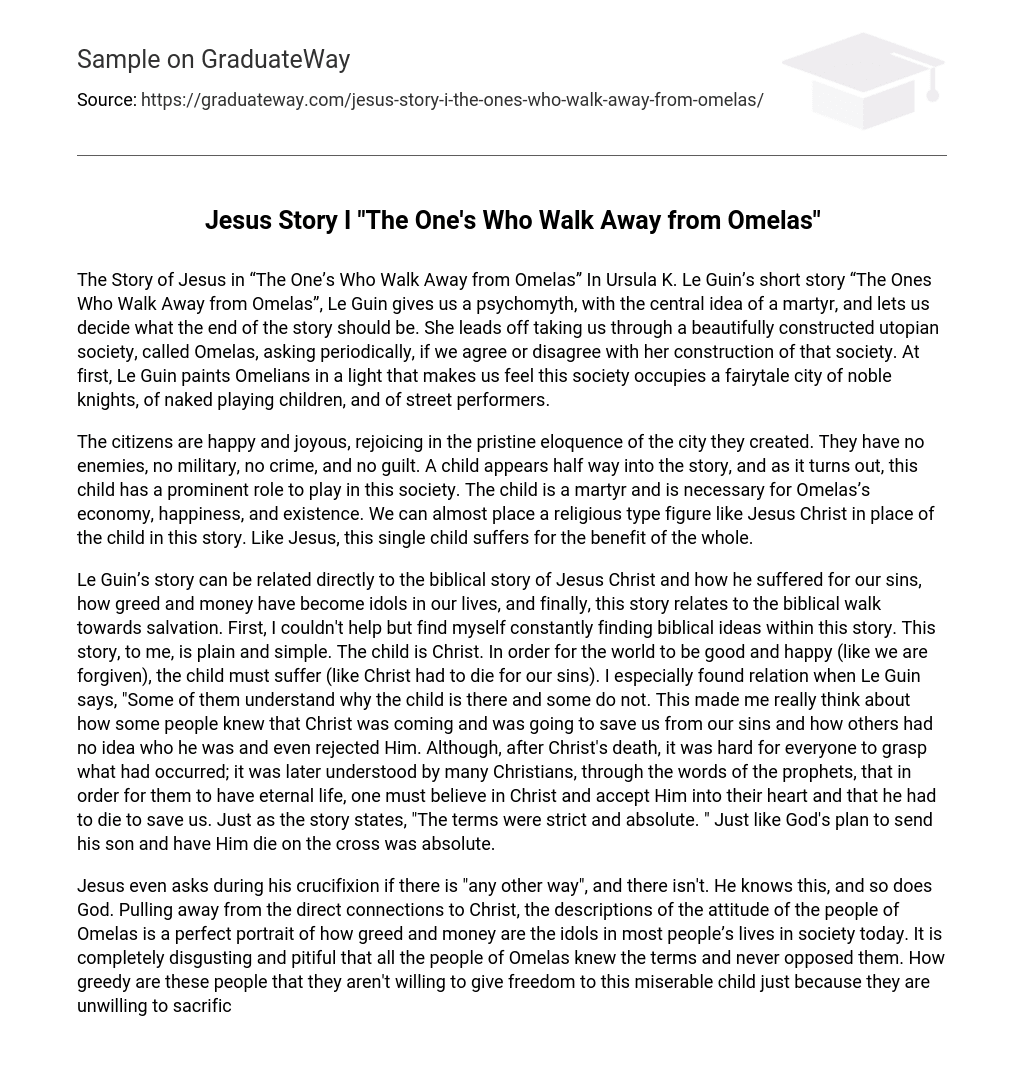The Story of Jesus in “The One’s Who Walk Away from Omelas” In Ursula K. Le Guin’s short story “The Ones Who Walk Away from Omelas”, Le Guin gives us a psychomyth, with the central idea of a martyr, and lets us decide what the end of the story should be. She leads off taking us through a beautifully constructed utopian society, called Omelas, asking periodically, if we agree or disagree with her construction of that society. At first, Le Guin paints Omelians in a light that makes us feel this society occupies a fairytale city of noble knights, of naked playing children, and of street performers.
The citizens are happy and joyous, rejoicing in the pristine eloquence of the city they created. They have no enemies, no military, no crime, and no guilt. A child appears half way into the story, and as it turns out, this child has a prominent role to play in this society. The child is a martyr and is necessary for Omelas’s economy, happiness, and existence. We can almost place a religious type figure like Jesus Christ in place of the child in this story. Like Jesus, this single child suffers for the benefit of the whole.
Le Guin’s story can be related directly to the biblical story of Jesus Christ and how he suffered for our sins, how greed and money have become idols in our lives, and finally, this story relates to the biblical walk towards salvation. First, I couldn’t help but find myself constantly finding biblical ideas within this story. This story, to me, is plain and simple. The child is Christ. In order for the world to be good and happy (like we are forgiven), the child must suffer (like Christ had to die for our sins). I especially found relation when Le Guin says, “Some of them understand why the child is there and some do not. This made me really think about how some people knew that Christ was coming and was going to save us from our sins and how others had no idea who he was and even rejected Him. Although, after Christ’s death, it was hard for everyone to grasp what had occurred; it was later understood by many Christians, through the words of the prophets, that in order for them to have eternal life, one must believe in Christ and accept Him into their heart and that he had to die to save us. Just as the story states, “The terms were strict and absolute. ” Just like God’s plan to send his son and have Him die on the cross was absolute.
Jesus even asks during his crucifixion if there is “any other way”, and there isn’t. He knows this, and so does God. Pulling away from the direct connections to Christ, the descriptions of the attitude of the people of Omelas is a perfect portrait of how greed and money are the idols in most people’s lives in society today. It is completely disgusting and pitiful that all the people of Omelas knew the terms and never opposed them. How greedy are these people that they aren’t willing to give freedom to this miserable child just because they are unwilling to sacrifice their own happiness?
This reminded me of many people alive today who have all these riches and things to be thankful for; things they idolize, or put before their relationship with Christ, and when someone less fortunate is obviously in need, they cannot bring it upon themselves to sacrifice some of their abundance to help out a fellow human. There are thousands upon thousands of homeless people, abused people, poor people and orphaned children all over the globe, and yet we still have the “Omelas” people living who refuse to sacrifice their own happiness to help out another in fear of becoming less happy upon doing so.
Sometimes, the greatest feeling in the world is helping out another person and sharing with them something that they need. And God calls us to love one another and help each other in life. Finally, the end the story could relate towards the biblical walk towards salvation. I read the last paragraph a few times because it really made me say “wow” out loud. What a powerful last thought to dwell over. Those who left Omelas, were always alone, and seemed to just know where they were going.
Those people have left behind everything that they cannot bear to have while the Child suffers, and chooses to give up everything they have for it. This is symbolic for someone giving up the ways of the world to turn to Jesus. Le Guin writes, “The place they go is a place even less imaginable to most of us than the city of happiness. I cannot describe it at all, it is possible that it doesn’t even exist. ” With this statement, it can be assumed that the people leaving Omelas are entering the Kingdom of God, which is so unimaginable because it’s so perfect and lovely.
It’s something that no one can fully describe without experiencing it, but that is an experience that cannot be told, for it occurs after we die. In conclusion, there are many ways to interpret Le Guin’s story “The Ones Who Walk Away from Omelas”, but I found the connections to the story of Christ most prominent. The reason for this could be that I am very new in my Christian faith, and Le Guin does urge the reader to envision their own ideas on what Utopia should be. All around, this story continuously connected me to Jesus and Heaven, and I found making those connections extremely interesting and enjoyable as a reader.





